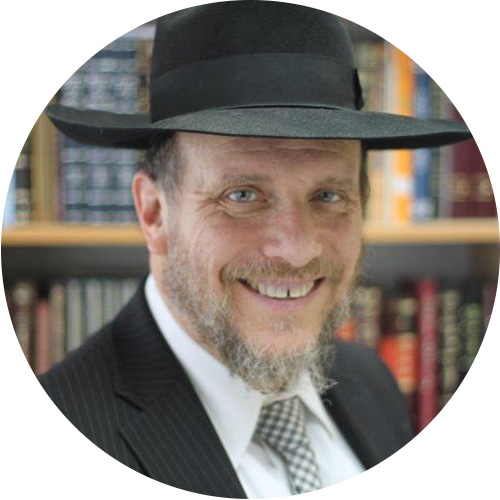Ask Rabbi Greenwald: Issue 968

Do I tell the super yeshivish son to just quit it? Can I force the others to accept him? Or is there a third option?
Q
WE have four sons born consecutively who have always gotten along pretty well, baruch Hashem. While we’ve heard about the kind of civil wars this dynamic can bring about, we really haven’t had much of an issue with it. Each of our sons has a different personality and skill set, and now that they are older, they are each learning in different yeshivos, where they are all doing well.
The issue is with the third son. Yeshivah is working well for him, too — almost too well. We started him off in a mainstream yeshivah, but that wasn’t enough for him, so we moved him to another place more to the right. He’s now all the way into it — his peyos flying out from behind his ears, his posture stooped, and his glasses sliding down the end of his nose.
When our boys come home for bein hazmanim, for the first time ever, I sense real tension between them. It’s a clear three against one. They call him “Rosh Yeshivah” and imitate the way he walks and how he pronounces certain letters. It really hurts me to see this.
I do think there’s something deeply psychological at play — i.e., that my other three sons feel their brother is looking down on them, which makes them feel rejected and defensive.
How do I navigate this? Do I tell the super yeshivish son to just quit it? Can I force the others to accept him? Or is there a third option?
A
IT is almost unfair to ask this question, as it touches on the very sensitive diverse and complex strands of our Torah world. B’ezras Hashem, I will offer an answer, but in the process, we’ll have to discuss a much deeper, broader topic. Please, readers, bear with me till the end, even if you feel offended by something that I write.
You began by saying that all your four sons are different, which isn’t news to anyone who has a number of children. Just remember that it makes sense that as they get older, those differences will manifest in myriad fashions.
As individuals, we are curiously drawn to different nuances in behavior, dress, food, learning, davening and lifestyle. We each have our character, nature and nurture. As a father of twins, I can testify that with all of the commonalities they share, there can be differences in personality and interests that vary along the broadest spectrum of possibilities.
When your third son decided that his original yeshivah “was not enough” and went “more to the right,” he wasn’t necessarily competing with his brothers or exhibiting extreme behavior. He was simply finding his space in the very broad spectrum of kehillos that comprise the mosaic of frum Yidden. He identifies with a more pronounced form of avodas Hashem. If you analyze his personality, you will probably observe that this identification with a clearer, more defined, and stricter set of rules manifests in other areas of his behavior, speech, and even interests.
This more right-wing identification might prove to be a passing stage in his development that will not remain a lasting one, but it’s also possible that this is the trajectory that will inform the direction of his life. What is presently clear is that he is trying to serve Hashem in the best way he knows.
IT isn’t uncommon for people who take on a more stringent standard in any area of life, whether education, business, eating healthfully, or exercising, to be judgmental of those who have not. When a person “frums out,” this dynamic can come into play as well.
The person’s new behaviors are a manifestation of his or her heightened awareness of the important value of “higher” or stricter standards. As with any other shift, this can signify a decision and commitment to real values, which will involve a lifelong journey of hard work, growth, and consistent dedication.
Alternatively, these new standards can be less about real inner growth and more about a lifestyle identification. The person takes on certain behaviors, or dresses a certain way, as a way of fitting in with a group of people whose standards he identifies with, even though he isn’t necessarily prepared to make the commitments that that lifestyle truly represents.
My late father Rabbi Ronnie Greenwald ztz”l was davening Minchah on Shabbos without his hat. A fellow who had recently joined the community whispered in his ear, “You know, you should be wearing a hat.”
My father responded, “I am not so religious.”
The man apologized and stepped away.
Two minutes later my father approached him and asked, “Are you religious?”
“Yes, yes,” the man responded, nodding vigorously.
“Then why are you embarrassing me?” my father asked.
There is a seeming contradiction between the Gemara’s narrative of Rochel being impressed with the special middos and integrity of the shepherd, Akiva, and what Rabi Akiva says about himself when referring to his earlier life: “When I was an am-ha’aretz (ignorant of Torah,) I would say, ‘If someone were to give me a talmid chacham, I would bite him like a donkey’ ” (Pesachim 49b).
The Tosafos in Kesubos 62b reconciles this apparent inconsistency by explaining that the simple Jews felt that talmidei chachamim considered themselves superior because of their Torah learning, and therefore, they thought that they were detested by these Torah scholars. In addition, the chachamim’s dedication to keeping a higher standard of taharah led them not to allow the simple people, who were not as well versed in the halachos, to touch them or their clothing. This also provoked the ire of the simpler people.
But, continues Tosafos, Akiva the shepherd was indeed a special person who kept Torah (to the best of his knowledge —ZG).
Your sons sound healthy, well-adjusted, and not very competitive. Right now, obviously, they are not feeling good about something. You might want to see if anyone is feeling challenged by the new “shtark” approach. Take notice if your son is saying things that are causing the others discomfort, or if they are feeling inadequate for their own, unrelated reasons. It’s worth a family discussion.
You can sit down with all your sons and start by saying something like this: “As your parents, we’ve always been proud of the wonderful relationship you share. We love you all, and you have always loved each other. We think that you are all very special people, children, and Torah Yidden.”
Then you can move along with some questions that you throw out for only the siblings to answer. Some questions will lead to a very dynamic conversation, while others may not go anywhere. Allow the dynamic to flow naturally, and make sure to continuously express that you appreciate what is being said as honest and helpful, even if you disagree with someone’s opinion.
You can ask a question to clarify, but this is not a stage of taking sides. Rather, you are helping everyone air their thoughts and feelings.
Possible questions could look like this:
Does anyone feel like there has been a shift in the relationships?
Can we figure out if this change or changes are all coming from the part of ourselves that we are proud of?
Do we want the changes to take root and change the family dynamic?
What can we do to restore the unity and understating that is so important to all of us?
If we let each other speak, and can hear things that we disagree with but are ready to consider as possibilities, we will be on the way to achdus and simchah in the family.
IN my second article in this series, I quoted Rav Dessler’s wonderfully deep explanation in the Michtav MeEliyahu in which he explains why it’s only possible to merit living in Eretz Yisrael through yissurim, painful challenges. By default, he says, anyone who comes to Eretz Yisrael and has a proclivity to growth will automatically see great accomplishments.
But the downside of that is that one may become prideful and look down at others who are not on his level, and then, he says, everything he achieves could be lost. Therefore, Hashem gives him difficulties to keep him humble, which thereby preserves his growth. This happens in families and communities as well. It’s an important lesson for all of us, and perhaps one your son may need to learn.
WE are faced with a very challenging social development in our Torah world that was foreseen by the last prophet, the Navi Malachi. In the last perek of Tanach, he describes the filtering process that will take place at the end of time.
And Hashem said, on that day that I will choose, I will have mercy on them as a man has mercy on his son that serves him. And once again you will see the difference between the righteous and the wicked, between those who serve Hashem and those who do not serve. Because the day will come burning like a furnace, and those who are intentionally evil and wicked will be like straw… and that same sun will shine for you who fear My name, with righteousness and healing….
Before Mashiach comes, there will be a process in which people will define themselves. Which side am I on? Hashem’s side? Or chas v’shalom the other side?
We see this alignment with good or evil happening all over the world, and in our world, the special world of Torah Judaism, it’s happening on the highest level.
We are living in a time when people are deciding to which sector they belong, be it “frum,” “Orthodox,” “yeshivish,” “chassidish,” “chareidi,” “chardali,” “kana’im,” and every other in description between and extreme. Of course, everyone is sure that their identification is the correct one. (Someone once facetiously commented that in the word frum, the U is in the middle, representing people’s perception that wherever you stand is normal, while anyone to the left is M-modern, and anyone to the right is FR-far right.
Kidding aside, you will find ovdei Hashem b’emes, true Jews trying to serve Hashem in the best way they can, across the spectrum of frum Jewry. And all ovdei Hashem agree that it is always good to be a better oved Hashem.
The yeshivah world (as in the yeshivish community and not the URL) has made an intense effort to separate themselves from the rest of the frum world, both with the highest commitment to halachah in general, and specifically with three “super standards”: severely limited technology, and dedication to limud Torah and tzniyus, with no shortcuts, no excuses, no compromise. This is a herculean attempt to protect the Torah world from the vices of the outside world.
As we mentioned earlier, there are those who are in for the full deal, and there are those identifying with the basic ideas. They live in those communities, want their children to attend those schools, they more or less keep to those three super standards, and they want to be better Jews.
Today it is no secret that there are “chassidim” who were once assumed to be tzaddikim, living the lifestyle that are hardly shomrei Torah umitzvos. There are yeshivah boys and girls, who were once considered the elite of Torah Jewry whose clothing is a costume. There are even some extreme yeshivish people who would like to be considered the gold standard of Yiddishkeit, but are more about the fight and less about the journey.
So no, lifestyle is not avodas Hashem, and unfortunately, is not even an indicator of good middos or integrity. And while we categorize people by the way they choose to identify themselves, and identification with a certain group is often an indication of a person’s commitment and dedication, it isn’t a determination.
Every person needs to know for himself if he is choosing a lifestyle or a commitment. Is he choosing to be a slave to the addictive world of evil, or is he trying his hardest to be a part of Hashem’s world of Toras emes?
Respect anyone who is willing to identify himself with a higher standard; in most cases, it will provide better protection and more commitment and dedication. But if you have made the decision to keep those standards, look down at no one, and make sure that you are truly working your hardest to represent that which you have chosen with sincerity and respect.
There’s one last point that’s very important from a chinuch point of view. Choosing how to raise your children is obviously of utmost importance. Therefore, if you want your children to join your journey, make sure that your journey is sincere and pleasant, respectful and joyful, unequivocal but accepting and inclusive. Young children cannot understand shades of gray, but adults demand to understand those shades, so that everyone can find their place in Hashem’s world.
Make sure to show respect to all your four sons, as we, the parents, do not want to be the ones who unwittingly seed the disrespect or nonacceptance.
(Originally featured in Mishpacha, Issue 968)
Oops! We could not locate your form.







